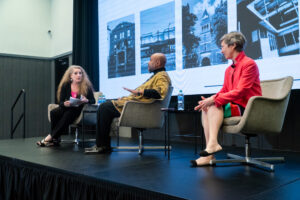Community leaders, stakeholders, and special guests convened at The Gathering Spot for Westside Future Fund’s March 15 Transform Westside Summit to discuss the revitalization and preservation of the MLK, Jr. Drive Corridor. Hosted by John Ahmann and Ebony Ford, the event featured insightful discussions and presentations aimed at driving positive change in the historic Westside neighborhoods.
The morning began with a moving devotion led by Rev. Dr. Herman Skip Mason, Historic West Mitchell Christian Methodist Episcopal Church’s Senior Pastor, highlighting the many contributions of Black women in celebration of Women’s History Month. The devotion featured Rev. Mason’s extensive photography archive filled with beautiful portraits of the women who shaped Atlanta. Maria Saporta, renowned journalist and founder of SaportaReport, moderated the Summit’s featured presentation on Atlanta Way 2.0, a nonprofit founded by Saporta. Panelists for the discussion included special guests Anne Cramer, IBM’s retired director of Corporate Citizenship & Corporate Affairs, and Board Chair for Atlanta Way 2.0, and Rev. Dr. Herman “Skip” Mason.
Community Engagement and Inclusivity
“Community engagement and inclusivity looks like this room. You are the activators, the advocates, the people who have made things happen,” Anne Cramer
The leading activation for the Atlanta Way 2.0 movement is the revitalization of the MLK corridor. According to Saporta, the nonprofit’s purpose is to bring all stakeholders together to address issues in the community. In addition to Cramer, former Atlanta Mayors Ambassador Andrew Young and Shirley Franklin are honorary co-chairs of Atlanta Way 2.0 among others. The “Atlanta Way” is a phrase referring to the collaboration between Black and white political and business leaders during the 1940s – late 1960s. Throughout the Summit, attendees engaged in meaningful dialogue, exploring collaborative strategies and innovative approaches to address the challenges and opportunities within the corridor. Cramer highlighted the importance of community engagement and inclusivity in the Atlanta Way 2.0 movement, emphasizing the role of each individual as an activator for positive change.
Benefits to Westside Residents
“We’re not going anywhere… we have some wonderful plans about what we want to see on that corridor,” Skip Mason
The discussion emphasized how Atlanta Way 2.0 and the MLK corridor revitalization efforts will directly benefit Westside residents by creating opportunities for economic growth, job creation, and community development.
Historical Preservation
The project’s focus on historical preservation aligns seamlessly with the Westside Future Fund’s ongoing efforts to honor and protect the community’s heritage. By preserving landmarks like Gaines Hall and revitalizing the MLK corridor, the initiative not only revitalizes physical spaces but also preserves the cultural identity and historical significance of the historic Westside neighborhoods.
Call to Action
The Summit concluded with a call to action, urging participants to become activators and continue the work of revitalization and preservation in the historic Westside neighborhoods. Attendees were encouraged to “join the movement,” knowing that these efforts will have a lasting and positive impact on the community for generations to come. Saporta put out a call for anyone interested in becoming an Atlanta Way activator to visit https://bit.ly/AtlantaWayActivators.
Miss the event? Watch the full Transform Westside Summit on YouTube.

